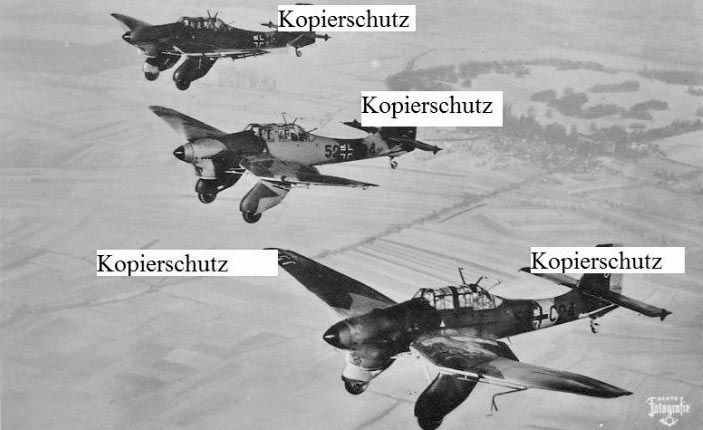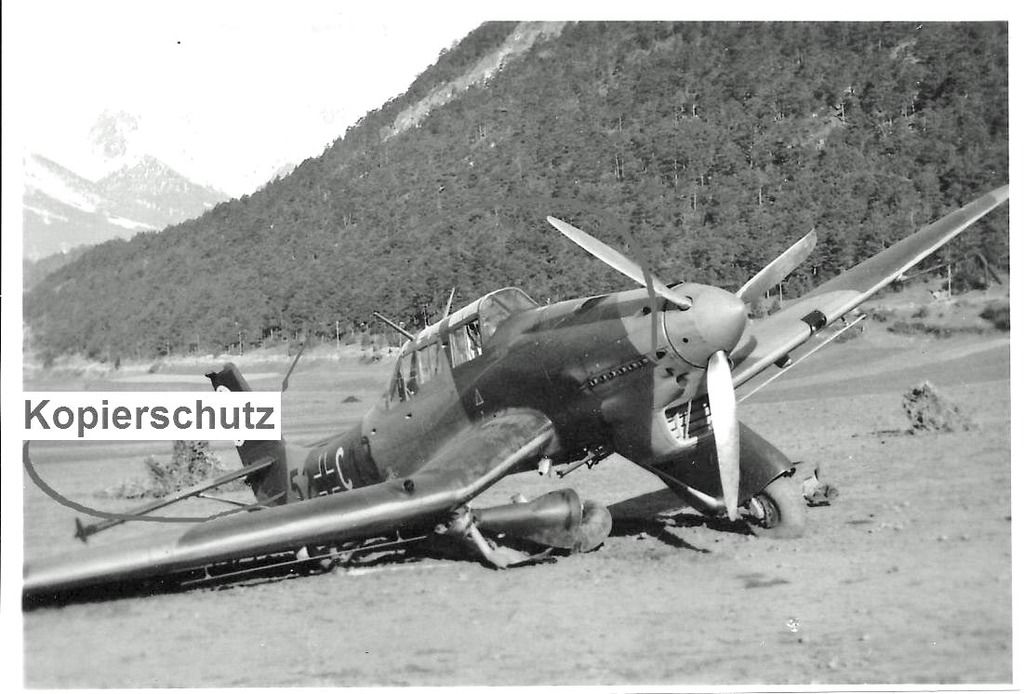
 |
|
|||||||
| Luftwaffe and Axis Air Forces Please use this forum to discuss the German Luftwaffe and the Air Forces of its Allies. |
 |
|
|
Thread Tools | Display Modes |
|
#31
|
||||
|
||||
|
Re: Camouflage colours on a Ju 87A
I have found this to be the case too. It seems that the diagram was only included in Merrick's very earliest and numerous, respectable works on LW camouflage and markings which is strange as it is quite an important document considering it is the only one that mentions these six schemes and mirroring. As already stated this also leads me to believe that there's a possibility that his views on the relevance of the diagram changed over the years between his first excursions into camouflage research and his later more refined opinions on the subject?
__________________
Luftwaffe Research Group |
|
#32
|
|||
|
|||
|
Re: Camouflage colours on a Ju 87A
You say that export schemes are irrelevant: but the "third scheme" is seen on He111P in Luftwaffe service, despite this variant not being exported.
You may be right about the scheme not seeing service, and it would be good to actually see one of these variants, but just casting doubts on sources doesn't answer the points suggesting otherwise. Far from Merrick abandoning an early idea, he continued to describe it in his final work on the subject. From his work for Classic Vol 1 page 45 partway down the second column. "...by using a mirror reversal option, plus rotation of two of the uppersurface colours..." Unless more evidence appears, we are just talking in circles. In the end, if the mirroring etc is ok for Uhlmann to accept then it's ok for me. |
|
#33
|
||||
|
||||
|
Re: Camouflage colours on a Ju 87A
That's fine Graham, but I prefer using primary sources to come to my own conclusions instead of relying on other researchers interpretations of what we are seeing in black and white photos. We all have eyes don't we? This ethic has born fruit that would have otherwise led me to make the wrong decisions in the past had I blindly put my trust in what had been previously published on the subject.
I have a valid reason to cast doubts as I have rigorously researched the scheme on the Hs123 and found that there are serious doubts concerning the case for multiple colour combinations of the same scheme. I have also discussed the subject in detail with a respected researcher currently working on the a forthcoming volume for the type and he was of the same opinion. So what do we do? Ignore our own observations just because other researchers have come to a different conclusion? That's not research in my book. You mention a third scheme on the He111, what photo are you referring to? Regardless, you have one photo that you can offer and you feel that you can claim that there was an entirely different official splinter scheme in use with the LW? Do you know the full background story of the He111 seen in the photo? It's assumptions like that that have led to many erroneous conclusions in the past regarding camouflage. Look, we are all free to make our own conclusions based on what we have personally researched whether that be from old books or perhaps taking it further into other sources of investigation. I'm open to other views and research backed up with evidence. You can accept my findings into the subject or not. Having your consent as to whether my opinions are valid is not something that particularly interests or drives me to continue what I do. 
__________________
Luftwaffe Research Group |
|
#34
|
|||
|
|||
|
Re: Camouflage colours on a Ju 87A
[quote=Modeldad;203479]
  These two photos posted by Modeldad (thanks!) show exactly what I meant in my original post: in "my" photo I see four distinctive shades on the top areas (just like on the same aircraft depicted in the top photo here), while the standard RLM 61/62/63 should show only three shades (exactly like the bottom photo here). Personally, I am not interested in the variants and delimitations of the so-called 'splinter scheme', but rather in the early camouflage colours. Thanks for all the good posts so far...
__________________
Dénes |
|
#35
|
||||
|
||||
|
Re: Camouflage colours on a Ju 87A
Dénes, unless you point out where you can see 4 colours on the upper surfaces of the Ju87s in those photos we are not really going to know what's what because I can only see three...

__________________
Luftwaffe Research Group |
|
#36
|
|||
|
|||
|
Re: Camouflage colours on a Ju 87A
OK, Clint (and other interested forumites), I give it another shot (attached).
I believe that #1=grey, #2=brown, #3=green, #4=unknown (possibly sand yellow/brown, not found on early RLM paint charts). I avoided on purpose to mark the overpainted area around the fuselage code. What's your opinion?
__________________
Dénes Last edited by Dénes Bernád; 29th October 2016 at 17:38. |
|
#37
|
||||
|
||||
|
Re: Camouflage colours on a Ju 87A
Thanks Dénes,
I refer again to my explanatory diagram posted previously in this topic here, as my views have not changed. What you have to take into consideration is that the multitude of differences in curvature and angles of certain areas of the aircraft's fuselage/cowling etc is going to give quite different tonal values compared to other areas on the aircraft that are painted in the same colour because of how the reflected light affects what our eyes and the camera sees. Dependent on the light source in each photo we could have a whole range of tonal values that are realistically all the same colour. The area on the nose that you suggest is colour 1 is mostly affected by the reflection of the light source (sun). Because that particular area of the cowling is curving/facing directly into the sunlight it is reflecting the most light back at our eyes or the camera in this case. Take a look at the same area, but closer to the top of the cowling where it curves away from the direct sunlight. Notice that it gradually starts to get darker and thus closer in tone to the section that you mark as colour number 3... These two splinter segments are the same colour (RLM62 green). It's just the bright reflections from the sun light is affecting how the colour is perceived.  1 = RLM62 (Green) 2 = RLM61 (Brown) 3 = RLM62 (Green) too 4 = RLM63 (Grey) 
__________________
Luftwaffe Research Group Last edited by Clint Mitchell; 13th July 2015 at 00:49. Reason: Added the key to the colours... |
|
#38
|
|||
|
|||
|
Re: Camouflage colours on a Ju 87A
Clint, to my eyes, the shade marked with #1 (light grey) is exactly the same seen on Modeldad's bottom photo, precisely at the same location. I have no doubts about it.
It is followed (from front to rear) by #3 (dark green), then #2 (dark brown), and so on. The only question I have is the shade of #4.
__________________
Dénes |
|
#39
|
||||
|
||||
|
Re: Camouflage colours on a Ju 87A
You can lead a horse to water, but you cannot... you get the picture... Adios amigos.
 4 is RLM63, clearly... 
__________________
Luftwaffe Research Group |
|
#40
|
|||
|
|||
|
Re: Camouflage colours on a Ju 87A
The question is, why does the RLM 63 look so pale? And what color is the area under the '24' (which looks much more like the normal 63). Fading is not an adeqate explanation because worn and weathered RLM 63 looks patchy rather than faded (I've looked at hundreds of photos from the Spanish Civil War last night and couldn't find a single example of badly faded RLM 63).
BTW, there are six combinations of three colors without any mirroring: 61/62/63, 62/63/61, 63/61/62, 61/63/62, 63/62/61, 62/61/63 |
 |
|
|
 Similar Threads
Similar Threads
|
||||
| Thread | Thread Starter | Forum | Replies | Last Post |
| Athens-Tatoi | Andy Mitchell | Luftwaffe and Axis Air Forces | 24 | 3rd May 2020 12:50 |
| 11.04.1944 Bay of Biscay battle ZG1 vs. RAS 151 sqn 248 sqn | FrankieS | Allied and Soviet Air Forces | 10 | 24th October 2012 20:44 |
| Ju188 lost in France | Eric Larger | Luftwaffe and Axis Air Forces | 16 | 16th December 2011 00:47 |
| Ju 87 in Foreign Service | Mirek Wawrzynski | Books and Magazines | 0 | 29th November 2005 13:36 |
| KG 30 Losses Sep 39-Mar 40 | Chris Goss | Luftwaffe and Axis Air Forces | 8 | 4th September 2005 10:48 |